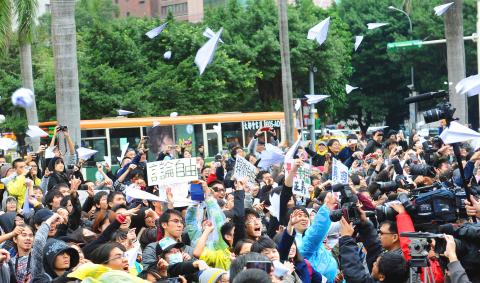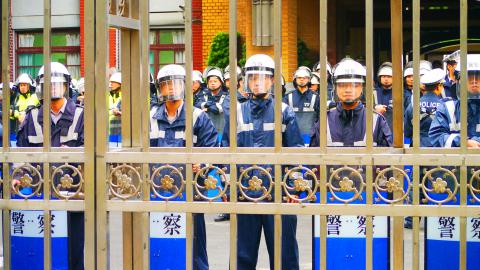Hundreds of young Taiwanese from around the nation yesterday continued to put pressure on the government to act against media monopolization and reject the sale of the Next Media Group’s (壹傳媒集團) Taiwanese businesses to two consortiums with a six-hour protest outside the Joint Government Office Building, where officials from the Fair Trade Commission (FTC) and academics were holding a public hearing on the sale.
Next Media Group signed an agreement on Tuesday to sell its four Taiwanese businesses — the Chinese-language Apple Daily, Next Magazine, Sharp Daily and Next TV — for NT$17.5 billion (US$600 million) to two consortiums comprised of Chinatrust Charity Foundation (中信慈善基金會) chairman Jeffrey Koo Jr (辜仲諒), Formosa Plastics Group (台塑集團) chairman William Wong (王文淵), Want Want China Times Group (旺旺中時集團) chairman Tsai Eng-meng (蔡衍明), Lung Yen Life Service Corp (龍巖集團) chairman David Lee (李世聰) and Taiwan Fire & Marine Insurance Co (台灣產物保險) chairman Steve Lee (李泰宏).
The sale has raised fears of a media monopoly and undue influence from China on Taiwan’s media, in light of the investors’ major business operations across the Taiwan Strait. Critics of Tsai, Taiwan’s wealthiest person, who made his fortune in China, have accused him of interfering with editorial matters at his other media outlets.

Photo: Chang Chia-ming, Taipei Times
For some of the protesters, the journey to Taipei began as early as 3:30am yesterday, as they boarded buses and headed for the capital to express their concerns about the deal.
A large delegation from the south was welcomed by loud cheers as it joined other participants outside the building, which was locked down under heavy security and barbed wire.
Police officers asked for the ID of anyone seeking to enter the building.

Photo: J. Michael Cole, Taipei Times
In all, about 500 people, mostly university students, braved the damp weather as the meeting began at 9am. According to the organizers, the participants came from 36 universities nationwide.
Some had already taken part in two protests in front of the Executive Yuan earlier this week organized by the student group Youth Alliance Against Media Monsters, which also helped organize a much larger protest on Sept. 1 against the planned acquisition by Tsai of the cable TV services operated by China Network Systems (CNS, 中嘉網路).
In a display of fraternity, representatives from each academic institution were invited up on stage to display banners or placards with the name of their school inscribed on them and they were greeted by huge applause.
As student leaders and academics addressed the young crowd, it soon became clear that few had high expectations that the FTC, along with the National Communications Commission (NCC), the Investment Commission and the Financial Supervisory Commission (FSC) — the agencies that are to review the acquisition — would do a thorough job.
Alliance convener Lin Fei-fan (林飛帆) said the demonstrators were asking the FTC to investigate the issue of horizontal and vertical media integration that would be caused by the deal, and to hold a legally binding hearing so that the review procedures would be transparent.
They are also demanding that the legislature enact an anti-media monopoly law as soon as possible, Lin said.
“We will give the FTC two weeks to prepare for and hold a hearing, and we demand that it reject the deal in a month,” Lin told the protesters.
Chen Wei-ting (陳為廷), one of the student leaders, said the students had two serious concerns — that a media monopoly is taking shape while the government remains clueless and fails to deal with the issue, and the growing influence of China on Taiwanese media.
Representative from civic groups also voiced their concerns about the deal, with Taiwan Democracy Watch saying in a statement that the government should do whatever it takes to keep media outlets from falling into the hands of a select few.
Leung Man-to (梁文韜), a political scientist at National Cheng Kung University who supports the students’ cause, said the deal was neither a business nor a legal issue, but a political issue.
Leung said he fears a “purple terror” is descending on Taiwan, in reference to Beijing’s influence, because “when you mix red [which represents the Chinese Communist Party] and blue [the Chinese Nationalist Party (KMT)], you get purple.”
Several promising young film directors, including Yeh Tien-lun (葉天倫), Yang Ya-che (楊雅) and Cheng Yu-chieh (鄭有傑) also showed up to express their support for the students, as did Democratic Progressive Party (DPP) legislators, led by Pan Men-an (潘孟安), and People First Party (PFP) Legislator Thomas Lee (李桐豪).
In the afternoon, the demonstrators headed to the legislature, where they continued their protest as about 100 police officers equipped with riot shields looked on.
The legislative caucuses of the DPP, the Taiwan Solidarity Union and the PFP all signed letters of commitment pledging to do their best to block the deal and to work on an anti-media monopoly law.
The KMT caucus refused to attend the event and sign the letter, saying the students’ protest was illegal.
Unhappy with the KMT’s response, the students marched to the front gate of the legislature and asked the party to “come out and address the issue.”
Student organizers surprised everyone with what they described as a “call-out tactic.” They telephoned KMT caucus whip Lin Hung-chih’s (林鴻池) office and played the conversation on loudspeakers.
Li Shing-hong (李成康), a student leader in Hong Kong’s “anti-brainwash movement” earlier this year telephoned Lin, but the person who answered the telephone said that the caucus whip was in a meeting and could not take the call.
The students then folded the letters of commitment into paper planes and threw them into the grounds of the legislature.
Before the protest ended at about 3pm, the students pledged to return to the streets of the capital — possibly in front of the Presidential Office — if the government “keeps playing dead” on the deal.
The DPP caucus said it would propose suspending the deal until anti-media monopoly regulations are in place.
DPP headquarters reiterated the party’s opposition to the deal and pledged to “take all possible and necessary action” to block the merger, party spokesperson Lin Chun-hsien (林俊憲) said.

DAREDEVIL: Honnold said it had always been a dream of his to climb Taipei 101, while a Netflix producer said the skyscraper was ‘a real icon of this country’ US climber Alex Honnold yesterday took on Taiwan’s tallest building, becoming the first person to scale Taipei 101 without a rope, harness or safety net. Hundreds of spectators gathered at the base of the 101-story skyscraper to watch Honnold, 40, embark on his daredevil feat, which was also broadcast live on Netflix. Dressed in a red T-shirt and yellow custom-made climbing shoes, Honnold swiftly moved up the southeast face of the glass and steel building. At one point, he stepped onto a platform midway up to wave down at fans and onlookers who were taking photos. People watching from inside

A Vietnamese migrant worker yesterday won NT$12 million (US$379,627) on a Lunar New Year scratch card in Kaohsiung as part of Taiwan Lottery Co’s (台灣彩券) “NT$12 Million Grand Fortune” (1200萬大吉利) game. The man was the first top-prize winner of the new game launched on Jan. 6 to mark the Lunar New Year. Three Vietnamese migrant workers visited a Taiwan Lottery shop on Xinyue Street in Kaohsiung’s Gangshan District (崗山), a store representative said. The player bought multiple tickets and, after winning nothing, held the final lottery ticket in one hand and rubbed the store’s statue of the Maitreya Buddha’s belly with the other,

‘NATO-PLUS’: ‘Our strategic partners in the Indo-Pacific are facing increasing aggression by the Chinese Communist Party,’ US Representative Rob Wittman said The US House of Representatives on Monday released its version of the Consolidated Appropriations Act, which includes US$1.15 billion to support security cooperation with Taiwan. The omnibus act, covering US$1.2 trillion of spending, allocates US$1 billion for the Taiwan Security Cooperation Initiative, as well as US$150 million for the replacement of defense articles and reimbursement of defense services provided to Taiwan. The fund allocations were based on the US National Defense Authorization Act for fiscal 2026 that was passed by the US Congress last month and authorized up to US$1 billion to the US Defense Security Cooperation Agency in support of the

‘COMMITTED TO DETERRENCE’: Washington would stand by its allies, but it can only help as much as countries help themselves, Raymond Greene said The US is committed to deterrence in the first island chain, but it should not bear the burden alone, as “freedom is not free,” American Institute in Taiwan Director Raymond Greene said in a speech at the Institute for National Defense and Security Research’s “Strengthening Resilience: Defense as the Engine of Development” seminar in Taipei yesterday. In the speech, titled “Investing Together and a Secure and Prosperous Future,” Greene highlighted the contributions of US President Donald Trump’s administration to Taiwan’s defense efforts, including the establishment of supply chains for drones and autonomous systems, offers of security assistance and the expansion of